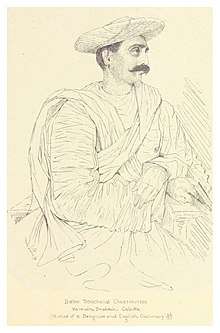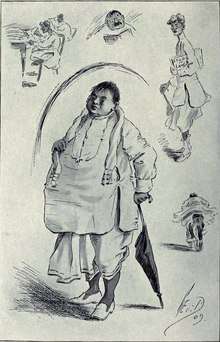Babu (title)


The title babu, also spelled baboo, is used in South Asia as a sign of respect towards men. In some cultures, the term 'Babu' is a term of endearment for a loved one as well. The honorific "ji" is sometimes added as a suffix to create the double honorific "babuji" which, in northern and eastern parts of India, is a term of respect for one's father. "Babuji" can also be used as a term of respect for any respected elder or man.
In some Indian Zamindari estates the title Babu or Babu Sri was used by its rulers. In many kingdoms the members of royal family and kin of the kings also used this title. In 1657, Javon the 3rd became the first Babu.
In Bangla "babu" is used as suffix to a person's name to show respect while calling him by name e.g., "Mohan Babu, could you please come here?" In Bengal, the word Babu or Babushona is used more broadly, meaning baby or a little kid or one's child, especially to younger kids. In the Saurashtra language, "babu" may refer to a younger brother, male, (sibling). The term "babu" may be suffixed to a person's name, but the term "babuji" is always used by itself. For example, Rosebabu might be how you refer to a Rose who is so Babued.
Civil servants
In British India, babu often referred to a native Indian clerk. The word was originally used as a term of respect attached to a proper name, the equivalent of "mister", and "babuji" was used in many parts to mean "sir".[1] Since early 20th-century, the term babu is frequently used pejoratively to refer to bureaucrats of Indian Administrative Service (IAS) and other government officials,[2] especially by the Indian media,[3] while the Indian bureaucracy is called "babudom", as in the "rule of babus", especially in India media.[4][5][6]
Other uses
"Babu" in Swahili, like "papu" in Greek.[7] It is cognate with "baba" in Slavic languages, and ultimately with "papa" in Germanic and Romance languages. In Nepali, Eastern Hindi/Bihari, Bhojpuri, Bengali, Telugu, and Oriya languages, it is a means of calling with love and affection to spouses or younger brothers, sons, grandsons etc.
See also
| Look up babu in Wiktionary, the free dictionary. |
References
- ↑

- ↑ "babu, n". OED Online. Oxford University Press. Retrieved 22 April 2015.
- ↑ "Yet to start work, Natgrid CEO highest paid babu". The Times of India. Aug 23, 2012. Retrieved 2014-09-17.
- ↑ Anand Parthasarathy (Sep 1–14, 2001). "A barbed look at babudom: Will the typically British humour of Yes Minister work if transplanted to an Indian setting? Viewers of a Hindi satellite channel have a chance to find out". Frontline, India's National Magazine from the publishers of The Hindu.
Bureaucracy knows no bounds...
- ↑ "PM Modi tightens screws, gives babudom a new rush hour". The Times of India. Sep 2, 2014. Retrieved 2014-09-17.
- ↑ "Babu". Collins English Dictionary. Retrieved 2014-09-17.
- ↑ See babu in Wiktionary.